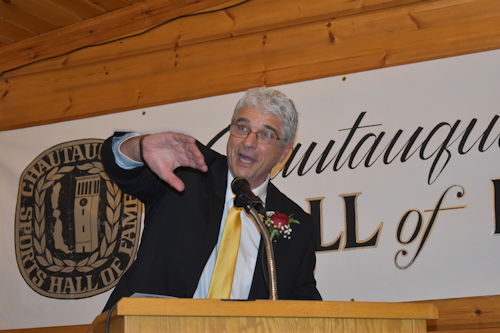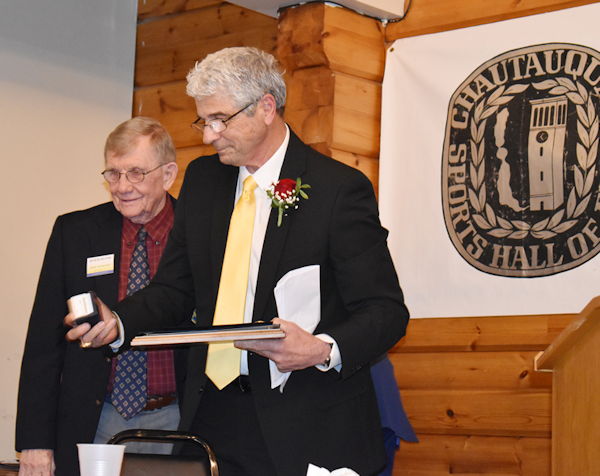The Post-Journal
by Cameron Hurst
February 22, 2020
Orlando Has Left His ‘Mark’

The love for the game blossomed early.
Growing up in a family of athletes — mostly baseball players — Mark Orlando’s youth in the grape vineyards of Northern Chautauqua County was highlighted by participation in team sports.
But, occasional trips north on the New York State Thruway to War Memorial Stadium helped solidify his choice of sport.
“My very first Buffalo Bills game, that was it … I’m eight or nine years old … I’m going to be a pro football player,” Orlando said.
Orlando will begin his second season as offensive coordinator at Grambling State University in the fall of 2020 and his 44th overall as a collegiate coach at historically black colleges and universities throughout the southern United States. And, while he never realized his own childhood dream, his career has given him the opportunity to help generations of young men realize theirs and then some.

“I’ve seen firsthand unbelievable stories of young men,” Orlando said Monday, just prior to his induction into the Chautauqua Sports Hall of Fame. “I probably have driven every red clay road in the state of Mississippi … in the cotton fields of Georgia, Louisiana on the bayous and I’ve signed hundreds of kids.”
That ability to travel runs in the family: his father was a traveling appliance salesman.
“He traveled all through Western New York and around Ohio,” he said. “I had the gene for jumping in the car and driving.”
The elder Orlando still was supportive of his son, however, encouraging him in his abilities and even vouching for him to one of Mark’s childhood heroes.
“As a young athlete, my dream was to go to Notre Dame,” he said. “My dad took my brother and I and mom to (South Bend) and I’ll never forget, he walked into Ara Parseghian’s office when I was 12 or 13 years old and told him, ‘That’s my son, Mark, and he’s going to be playing quarterback for you one day.'”
“Fast forward now, I was sitting in English class in my junior year of high school and I was trying to figure out, how was I going to get to Notre Dame from Westfield?” he said, noting his decision to transfer to football powerhouse Cardinal Mindszenty in Dunkirk.
“That’s the only school in this whole area where kids are getting football scholarships,” he said.
Orlando also chose to appeal once again to Parseghian and, to his surprise, actually received a response from the Fighting Irish football program.
“(Notre Dame’s quarterback coach) wrote me back and told me about a football camp in Massachusetts in July,” he said. “So, I went out in the grape vineyards, earned the money in time for the camp, caught a bus at about 10 o’clock out of Ripley and rode all night to Massachusetts. … The whole staff at Notre Dame was there at this camp.”
Other coaches from other schools also were in attendance, including a little known linebackers’ coach from Army named Bill Parcells. Orlando was chosen as the camp’s top quarterback but did not receive a scholarship to Notre Dame.
Instead, a year later, he was bound for Florida State, where Parcells had accepted the same position for the Seminoles.
“I don’t know if he had a hand in my recruitment,” Orlando said, “But, I was recruited by Steve Sloan … and him and Parcells were very close.”
At Florida State, Orlando endured the worst season in program history. After losing three of their last four games, Parcells implemented a winter conditioning program, composed of football drills under five-foot-high chicken wire, that led to a mass exodus of juniors and seniors from the program.
“Thirty players quit the team,” Orlando said. “Meanwhile, Parcells leaves and goes to Vanderbilt. The press finds out about it and there’s a huge fallout. It crushed the morale of the team.”
The Seminoles went 0-11 that season and Orlando started during that stretch. But, he soon realized that his dreams of being a pro quarterback would not pan out.
“Unfortunately, I had a chance to play, but sometimes those dreams don’t come true and ended up going into coaching,” he said. “I remember my last opportunity of playing football and you knew that dream was not going to come true.”
After his graduation from Florida State, Orlando coached and taught for two years at Lincoln High School in Tallahassee, encountering college coaches throughout the south. While a chance to become a graduate assistant did not pan out, a unique opportunity presented itself.
“There was this other school in town called Florida A&M University and I’m looking at the team picture and they had a new coach named Rudy Hubbard,” Orlando said, noting that the Rattlers’ head coach was the first African-American coach at Ohio State.
“I looked at the picture and I thought, ‘Wow. He has a white coach,'” he added. “I just wanted to coach. I didn’t care.”
Orlando’s appeal to Hubbard was successful and his career was off to a fast start: the Rattlers won the first Division I-AA National Championship that same season with a victory over the University of Massachusetts.
Offers began coming soon from legions of different HBCUs as “Coach O” became a fixture in the deep south, promising each mother that the school he represented would provide her son “three hots and a cot.”
“A lot of those kids, that was their issue,” Orlando said, expounding on the promise of three hot meals and a bed to sleep in for each player. “They were just not getting the nutrition they needed at home. We didn’t have the same type of facilities some of these other big schools had. But, one thing we would do is feed them.”
“I’ve sat in every living room of every kid I’ve ever recruited,” he added. “These parents would be so proud that their son was going to college on a football scholarship. That meant more to me, working and giving those kids opportunities.”
Still, Orlando’s tenure as a white coach in predominantly African-American programs did not come without its challenges: no more so than during his first stint as offensive coordinator at Southern University in 1996.
“The young man we had penciled in to play quarterback flunked out of school during the summer,” Orlando said, noting that one of his wide receivers recommended a quarterback at Louisiana Tech who was looking to transfer.
“He said, ‘Coach, he’s a white boy, but he can throw,'” Orlando recalled.
The decision to sign the quarterback, Marcus Jacoby, drew the ire of players, students and community members alike. New York Times columnist Ira Berkow even spent a year with the team documenting the challenges.
“It was a tough situation,” Orlando said. “I’m white, he’s white. The coaching staff, we were all together on it, but some of the players had an issue with it. They thought there was favoritism.”
And, though the team eventually came together in time to forge a run to a bowl game, the struggles continued two seasons later.
“My job was to put the best player on the team out on the field to help us win a game,” Orlando said. “Two seasons later, Marcus didn’t have the speed the backup did, so if we couldn’t block him, we wanted to put someone out there who could make them miss. He just had a hard time being benched, especially in that situation, and he quit the team and football. I have never talked to the young man since.”
“It wasn’t a racial thing,” he added. “I’ve never looked at color. It was just a coaching decision that Marcus witnessed when he came back to watch us play again. It was just about winning and getting the job done. That was my job.”
The trials and tribulations never deterred him, though. Through stops at Southern, Texas Southern, Bethune-Cookman, Prairie View A&M, Alabama State and now Grambling State, Orlando has enjoyed every second.
“I went through tonsil cancer a few years back, I thought it was over and was ready to retire,” he said. “Coach (Broderick) Fobbs at Grambling called me up and said, ‘Hey, you got some more play-calling in you?’ I said, ‘Yeah, coach.’ He said, ‘C’mon. I need a play-caller.'”
Now, those red clay roads of the south have led him home, where his career will permanently be on display as an inductee into the Chautauqua Sports Hall of Fame.
“At Westfield, a teacher would read us Huckleberry Finn and I remember in the story, they would talk about the Mississippi River,” he said. “I would go up to the globe and look on the map and think, ‘Man, that feels so far away.’ And then, to be at Southern University which is right on the Mississippi River … I thought to myself that everything I dreamed about, I never thought it would come true.”
“It’s been an unreal ride and an unbelievable journey.”
The additional financial assistance of the community is critical to the success of the Chautauqua Sports Hall of Fame.
We gratefully acknowledge these individuals and organizations for their generous support.











